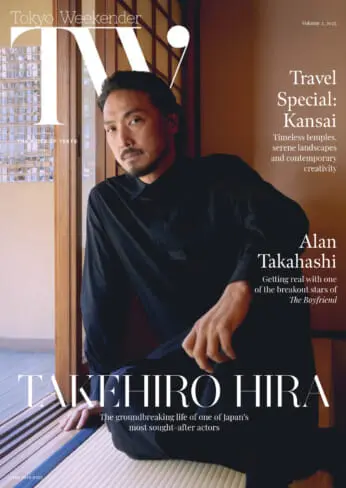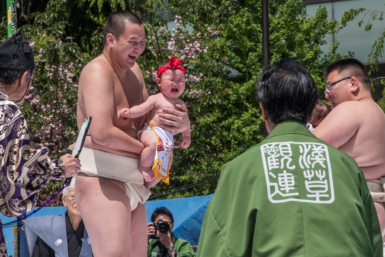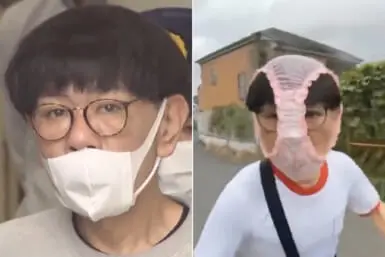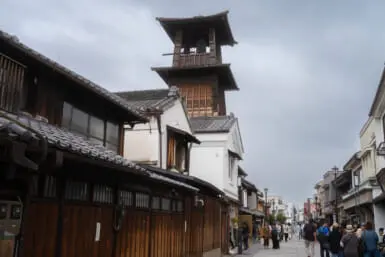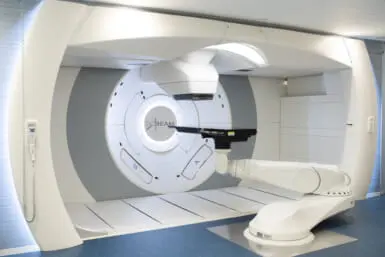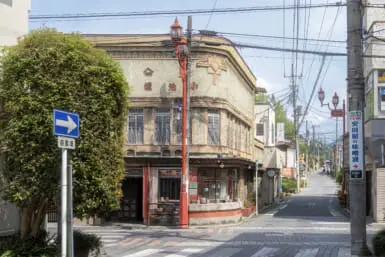by James Yellowlees
Jim Dougherty relates the following true story of his struggle with Japanese, which Tim Ernst captured in our cover illustration:
When I first arrived in Japan and could speak even less Japanese than I do now, I went to a sushi restaurant. After having several different types of sushi, I looked in my English-Japanese dictionary for a word to let the chef know I was finished and for him to tell me how much money I owed … so I came up with the word … ikura (how much)?
He nodded and made two servings of ikura (fish roe).
Lost for words, I ate the ikura, thinking of how I could get the bill from the chef. I decided to try English… so I asked, “How Much?”
The chef nodded and repeated, “hamachi.”
After eating the hamachi (yellow tail), I became concerned about the price of this meal and tried English again… “Master, economy please! … economy!”
He nodded again and repeated …”Ika no mi” (squid skin).
Needless to say, I was very frustrated and heavily sighed, saying “Golly … shoga nai.” (I give up.)
The chef quickly responded by placing ginger in front of me … saying “Shoga (ginger) arimasu.”
Perhaps it isn’t totally true, but the point of Jim’s story is well taken. Japanese is difficult to master and can be quite confusing for beginning speakers and those trying to figure out what you mean. Still, if you stick with it, you can enhance your stay in Japan tremendously. Your hosts will cheer you on and appreciate your efforts. And what better place to learn the language anyway, where every day you have chances to reinforce your learning.
These days it is clear that Japanese language education for non-Japanese students has improved dramatically. There is less emphasis on the stultifying four-year method of teaching every conceivable fine point of Japanese grammar and more emphasis on cutting through to the key points that allow for quick and effective communication.
Japanese language schools now tend to specialize on specific markets: language acquisition for business people, language for academic and technical school preparation, and more hobby- or culture-oriented programs are just some of the examples.
In addition, self-study tools, some CD-ROM and text-based and some web-based, are becoming increasingly available and effective.
In selecting a method of study, it is important to consider the following factors:
- Aims: what do you realistically hope to achieve in your studies, when you consider it takes the average person two full years of intensive study in a Japanese-speaking environment to become functionally fluent?
- Type of program: Does the program you are considering have the right type of focus; i.e. is it adequately business-oriented, if that is what you want?
- Program Cost: This varies from school to school, so it is best to check on tuition prices. Sometimes financial assistance and scholarship programs are available, so it is important to find out whether you might qualify and what the application process entails.
- Location: In reality it is best if the school is located close to your home and/or place of work. Sometimes it is best to study outside of Tokyo and other major cities, as there tend to be fewer distractions.
- Is there too much emphasis on the written language and fine points of grammar? This may not be desirable if your goal is to be able to communicate as you travel through Japan in your off time.
- What is the class size? Classes that focus on conversation should not have more than 10 students, while academic preparatory courses should not have more than 20, if you are to maximize your study time.
- Are the instructors sharp and flexible? If not, you may become frustrated.
- What is the mix of nationalities? Too much emphasis on one or two nationalities may not produce the most desirable learning environment.
- Text and Learning Tools: Does the school have updated texts and learning tools? There is constant innovation in this field, and it is important that schools be on top of the latest texts, products and methods.
- Evaluation and Testing: Does the school have a proper method for evaluation and testing? This is of critical importance if you are goal-oriented and have levels to reach and timelines to meet.
The following is a list of some of the better programs and methods in Japan. These schools have been extensively researched and have been found to be suitable for inclusion.
1)Academy of Language Arts (Iidabashi, Tokyo)
ALA programs really excel in getting students to speak well. ALA features small classes, cultural study options and a supportive infrastructure. ALA provides solid corporate and institutional language courses both at the Iidabashi location and at client offices and also does high-quality Japanese language teacher training programs.
Tel: 3235-0071; fax: 3235-0004.
2)Association for Japanese-Language Teaching (AJALT) (Toranomon, Tokyo)
AJALT has produced and published the very popular and practical Japanese for Busy People series of texts and tapes. The small classes are divided into Beginner, Intermediate and Advanced levels. Specialties include youth classes, newspaper reading classes, academic preparation courses and corporate training.
Tel: 3459-9620; fax: 3459-9660.
3)Alpha Japanese School (Tokyo, Osaka and London)
Alpha specializes in teaching business professionals to learn functional Japanese that will assist them in the workplace and in business situations.
Tel: 3504-8080; fax: 3504-8181.
4)Asia Bunka Kaikan (ABK) (Bunkyo-ku, Tokyo)
ABK is a unique non-profit school that mainly serves students from Asia, although students from all countries are welcome.
Tel: 3946-2171; fax: 3946-7599.
5)East West Japanese Language Institute (Nakano-ku)
The environment is friendly and the emphasis is on small classes and having students focus on Japanese language and cultural learning as well as business. Interesting field trips such as hiking, bus trips and Kabuki plays are organized by the school staff for the students and Japanese teachers and volunteers to participate.
Tel: 3366-4717; fax: 3366-4954.
6)Enfour Group
The Enfour Group specializes in unique cellular phone and PDA solutions. Its popular Tango Town solution allows users to work on vocabulary at their own speed and convenience.
Tel: 5411 -7738; fax: 5411-7704.
7)Futaba College of Foreign Languages (Chiba)
The Futaba College of Foreign Languages is affiliated with the East West Language Institute and is conveniently located in Chiba City.
Tel: (043) 244-9081; fax: (043) 244-9332.
8)Miroku no Sato Japanese Language School (Hiroshima)
Miroku no Sato specializes in preparing students for going on to higher education and enjoys a 100 percent success rate in having its students move on to their levels of choice.
Tel: (0849) 88-0822; fax: (0849)88-0881.
9)Human Academy (Shinjuku, Tokyo, and Osaka)
Students are able to mix with Japanese students who participate in a wide range of professional development courses Human Academy offers, and they are able to join these classes when they achieve sufficient language levels.
Tokyo Tel: 3342-4741; fax: 3342-4731.
Osaka Tel: (06) 6282-6098; fax: (06) 6282-6198.
10)Kanrin Japanese School (Aoba-ku, Yokohama)
The Kanrin Japanese School provides high-level instruction in a green and relaxed environment.
Tel: (045) 983-2228; fax: (045) 983-5373.
11)Kichijoji Language School (Kichijoji, Musahino City, Tokyo)
Class numbers never exceed 15 students per class, and the student make-up is multi-national. The teachers are all made very aware of the personal goals of each student and work hard to help the students achieve their goals.
Tel: (0422) 47-7390; fax: (0422) 41-5897.
12)Kyoto Center for Japanese Linguistic Studies
Kyoto Japanese Language School (Kyoto)
Classes do not exceed 10 students, and the school currently has 140 students enrolled in a range of programs. The Kyoto Japanese School also handles training for Co-op programs, the JET program, embassies and corporations on contract.
Tel: (075) 414-0449; fax: (075) 441-9055.
13)Kyoto International Center of Languages
The Kyoto International Center of Languages was established in 1969 and currently has 120 students. It features superior academic preparation courses and nearly all of its graduates go on to higher education.
Tel: (075) 722-5066; fax: (075) 722-5067.
14)Sendagaya Japanese Institute (Takadanobaba / Naka Ochiai, Tokyo)
Sendagaya Institute is conveniently located near Takadanobaba. It is well known for its Japanese language teacher training and runs small classes at the Beginner, Intermediate and Advanced levels.
Takadanobaba Tel: 3232-6234; fax: 3232-9120.
Naka Ochiai Tel: 3232-6181; fax: 3232-6197.
15)Shinjuku Japanese Language Institute (Takadanobaba, Tokyo)
The classes are small (10 students maximum) and most graduates go on to technical school, college and university programs in Japan.
Tel: 5273-0044; fax: 5283-0018.
16)Toa Gakuin (Kasumigaseki, Tokyo)
Located in the heart of Kasumigaseki (and a one-minute walk from Kasumigaseki Station), Toa Gakuin is very strong in IT Japanese and Business Training and is also able to assist graduates in finding employment in Japan.
Tel: 3581-0401; fax: 3581-0448.
17)Tokyo School of the Japanese Language: Naganuma School (Shibuya, Tokyo)
The Naganuma School places an emphasis on having its students learn proper Japanese, along with appropriate cultural interpretations, in a business context.
Tel: 3463-7261; fax: 3463-7599.
18)Trident College of Languages (Nagoya)
Trident College of Languages is affiliated with Kawai Juku and has ample opportunities for interaction with Japanese students and participation in local events and sporting activities.
Tel: (052) 735-1605; fax: (052) 735-1722.
19)Yamasa Institute (Okazaki, Aichi Prefecture)
The Yamasa Institute offers progressive online and on-campus programs for Japanese-language learners.
Tel: (0564) 55-8111; fax: (0564) 55-8113.
20)Yoshida School (Waseda, Tokyo)
Yoshida specializes in handling students who plan to go on to technical school, college and university courses and working professionals in individual, group and outsourced situations.
Tel: 3204-4618; fax: 3202-0292.
